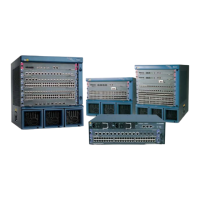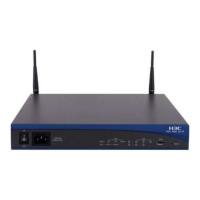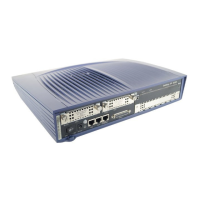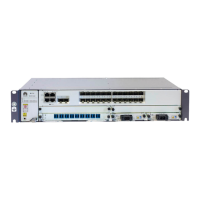Networking Requirements
RPF check is the basis of route selection and unicast routes are used to forward multicast traffic.
According to RPF check, a unique route is selected to guide the forwarding of multicast data. If
multicast traffic is heavy, network congestion may occur and multicast services are affected.
Multicast load splitting extends the multicast route selection rule and is independent of RPF
check. If there are multiple optimal equal-cost routes on a network, they may be used to forward
multicast data. Multicast traffic can be load balanced amount multiple equal-cost routes.
Currently, multicast load splitting can be performed based on the source address, group address,
and source group address, without meeting requirements of load splitting in all the scenarios. If
multicast routing entries and network configurations are stable, RPF interfaces and RPF
neighbors remain unchanged. If a few multicast routing entries are used, traffic among equal-
cost routes may be distributed unevenly.
The stable-preferred multicast load splitting policy offsets the disadvantages of the preceding
load splitting policies. As shown in Figure 14-1, three equal-cost routes are available from
SwitchE connected to HostA to the multicast source. The stable-preferred multicast load splitting
policy is configured on SwitchE so that entries are evenly distributed to the three equal-cost
routes. Load splitting among equal-cost routes is implemented.
If forwarding capabilities or traffic congestion degrees of the three equal-cost routes of
SwitchE are different, multicast entries cannot be load balanced. You need to configure uneven
load splitting on SwitchE, set different load splitting routes for upstream interfaces, and change
the number of multicast entries on the equal-cost routes. In this manner, multicast entries on the
equal-cost routes can be controlled flexibly.
Figure 14-1 Networking diagram for configuring multicast load splitting
SwitchA
GE1/0/0
GE2/0/2
GE2/0/3
GE2/0/1
GE1/0/0
GE1/0/0
GE1/0/0
SwitchB
SwitchC
SwitchD
GE1/0/1
GE2/0/0
GE2/0/0
GE2/0/0
GE1/0/2
GE1/0/3
GE2/0/0
Loopback0
HostA
Source
SwitchE
PIM-SM
Switch
Interface IP Address Device Interface IP Address
SwitchA GE1/0/0
VLANIF10
2001::2/64 SwitchC GE1/0/0
VLANIF70
2003::2/64
GE2/0/1
VLANIF20
2002::1/64 GE2/0/0
VLANIF80
2006::1/64
Quidway S7700 Smart Routing Switch
Configuration Guide - Multicast 14 IPv6 Multicast Routing Management
Issue 01 (2011-07-15) Huawei Proprietary and Confidential
Copyright © Huawei Technologies Co., Ltd.
524
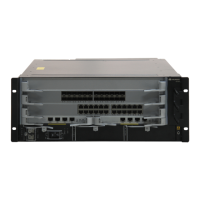
